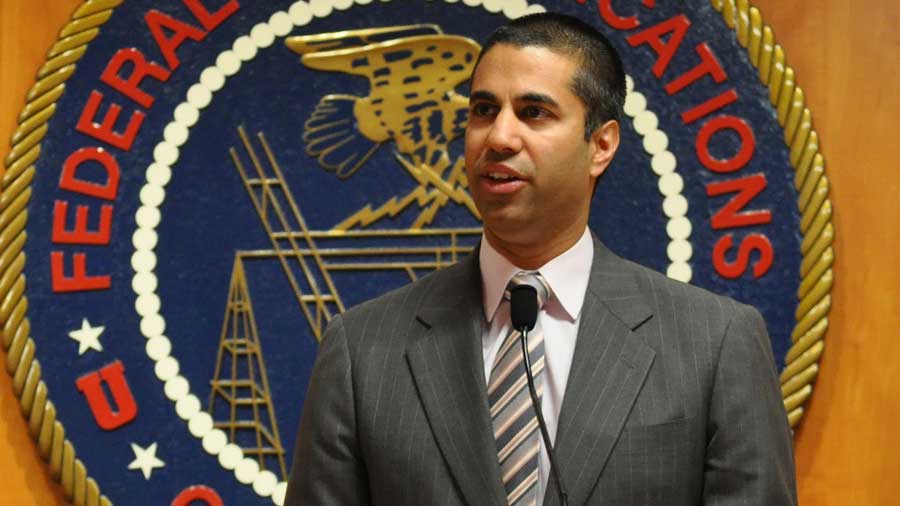ACA Summit: Pai: Open Internet Order Was 'Galling Regulatory Onslaught’

The smarter way to stay on top of broadcasting and cable industry. Sign up below
You are now subscribed
Your newsletter sign-up was successful
Neither rain nor snow nor a federal government shutdown kept the American Cable Association from plowing ahead with its annual D.C. Summit, or FCC chairman Ajit Pai from making the rounds with a keynote speech Wednesday morning (March 21), according to a copy of that speech supplied by the chairman's office.
Read More: ACA Summit
Pai praised smaller cable operators for broadband deployment and as a competitive force, and renewed his attacks on edge providers in the network neutrality rule debate.
Pai took aim at edge providers he said had pushed Title II on ISPs large and small. Those edge providers are an increasingly familiar target in Washington in conversations about power over internet content.
"Silicon Valley tech giants with market caps in the hundreds of billions of dollars demanded that the FCC regulate small companies like yours more heavily than they were!," he said. "That’s right... [T]hey claimed that small broadband providers like Spencer Municipal Utilities and Laurens Municipal Utilities were anticompetitive monopolists who posed a greater threat to a free and open Internet than companies like Google, Facebook, and Twitter. Some of us understood back in 2015 that this was absurd. In 2018, with each passing day, many more people are waking up to reality."
Related: FCC's Pai to Keynote ACA Summit
The 2015 Order was specifically targeted to ISPs by an FCC, under chairman Tom Wheeler, that labeled them the monopolistic threat to an open internet that required regulating as common carriers.
The chairman said that one of the impediments to competition, including by imposing unnecessary cost burdens on smaller operators, has been the Title II-based network neutrality rules, which he, along with his Republican colleagues, voted Dec. 14 to eliminate.
Pai said that outside the Beltway, the top consumer complaint is not about blocking content, it is about access and competition. that requires private investment, which is why he says overregulation is a problem, one he sought to address with his rollback of the 2015 Title II order.
He said the order had been a "galling regulatory onslaught" and a "a rush to cram down heavy handed regulation," with money having to be siphoned off to pay lawyers and consultants to make sense of the new rules--against blocking, throttling, paid prioritization and whatever else the FCC concluded violated net neutrality--money smaller operators could ill afford.
He said ACA members were hardly the "insidious, all-powerful monopolists" that the rules were ostensibly meant to rein in.
Pai's principal message to the assembled small and midsized cable operators on the Summit's 25th anniversary was that they had embraced broadband early on--and he had apparently done his homework. He cited member Hotwire Networks' commitment to an all-fiber network two decades ago, and Wave Broadband's new cybersecurity defenses against DDoS attacks, saying ACA members had always been looking out for the new thing.
Pai said the key reasons why the public benefits when smaller operators succeed are that 1) they help close the digital divide--they are often on the frontlines of rural broadband, a Pai priority, and 2) they drive competition.
"Nearly half of the 18 million households served by ACA members are in small cities or rural areas, like Zelienople, Pennsylvania, which I saw early in my tenure as Chairman," he said. "Indeed, without any subsidies, you’ve already built out networks that reach 840,000 homes in areas that the FCC has identified as the most expensive to serve."
On the competition side--competition being crucial to Pai's deregulatory philosophy--the chairman signaled ACA members were a key driver.
"Currently, over 700 small providers deliver Internet service to more than 7 million subscribers," he said. "These businesses—many of them ACA members—have invested $2 billion per year to upgrade networks and expand service areas. This investment, in turn, helps create many well-paying jobs in communities that often are struggling. And much of this expansion comes in areas with an incumbent. This competition creates incentives for better service and lower prices for consumers.
The chairman was obviously preaching to the choir, but he thanked ACA leadership and members for their efforts on broadband deployment. "Thanks to the members of ACA for serving your communities—large and small, from coast to coast. ACA’s members connect more than 18 million American homes to both economic opportunity and entertainment," he said. "I appreciate the difference you’re making because I’ve seen it."
Pai put in a plug for the FCC's newly opened application window for Connect America Fund Phase II USF broadband subsidies, which are being offered up to ISPs in a reverse auction. "I strongly encourage ACA members to take a hard look and consider competing to serve eligible areas."
The smarter way to stay on top of broadcasting and cable industry. Sign up below
Contributing editor John Eggerton has been an editor and/or writer on media regulation, legislation and policy for over four decades, including covering the FCC, FTC, Congress, the major media trade associations, and the federal courts. In addition to Multichannel News and Broadcasting + Cable, his work has appeared in Radio World, TV Technology, TV Fax, This Week in Consumer Electronics, Variety and the Encyclopedia Britannica.

